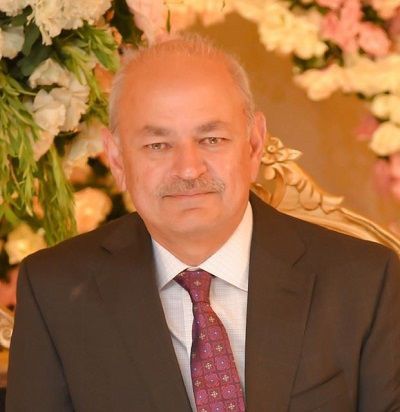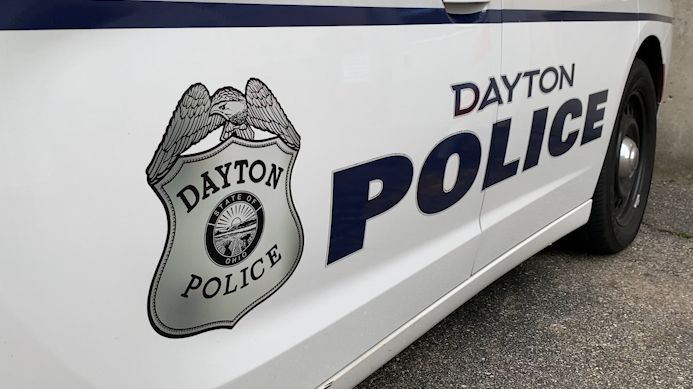DAYTON, Ohio — Kamran Afzal doesn't start his job as Dayton's new police chief for another few days. But the longtime lawman was in town last week to get his personal affairs in order.
What You Need To Know
- Kamran Afzal is Dayton's new police chief
- He plans to meet with more than 250 individuals and groups in his first few weeks on the job
- He said he supports the police reforms underway in Dayton and appreciates the city's collaborative approach to community policing
- His first day is Dec. 20
It was Afzal's second trip to the Gem City since City Manager Shelley Dickstein announced his hiring in late October. All told, he's visited the city four times, including twice during the months-long application process.
The 30-year law enforcement veteran is leaving his post as police chief in Hopewell, Va., to take on his new role in Southwest Ohio.
"It has been very positive,” Afzal said of his initial opinion of the city. He spoke highly of the development in downtown and was complimentary of its overall look and feel. He said the people have made the biggest impression, though. At times, their friendliness has caught him by surprise.

“The people have been so friendly," he said. "There’s definitely been a few instances where people I didn't know just came up to say hi. That’s not something you see everyday in the Washington, D.C., area. It happens, but not with this type of frequency."
Afzal’s most recent trip here is to set up his new home for him and his wife's move from Virginia.
"I'm just dropping some stuff off here so when I come back in two weeks, I don't have to worry about what clothes I want to wear," he said with a wry smile on his face.
Afzal will begin his duties Dec. 20.
The city of Dayton plans to hold a welcome reception to introduce the community to Afzal and his wife, Mona, once they’ve settled in.
Hanging up clothes and dropping off kitchen supplies aren't the only tasks Afzal completed during his visits, though. He attended a few department roll calls and spent some time getting to know the rank-and-file officers and his new command staff. Meetings with the city's elected leaders also are taking place.
There's a list of about 250 organizations and community leaders that Afzal plans to chat with to learn their perspective and discuss the state of community policing.
He wants to make sure that he's "ready to go" on his first day.
The past few weeks have been spent reviewing a variety of DPD’s internal documents to get up to speed — reports, training manuals and studies.
"It's been a crazy few weeks, and I assume it's gonna stay that way for a little while until we kind of ease up into this position," Afzal said.
One of his major undertakings will be the continued implementation of local police reforms that developed following the death of George Floyd and a national movement for changes in law enforcement.
From June 2020 to April 2021, several working groups made up of city leaders and the community reviewed various aspects of law enforcement. They looked at police oversight, training, departmental use of force policies, and internal recruitment and promotion standards. They also examined ways to improve community engagement.
The group came up with more than 140 recommendations. The department already has implemented some of those recommendations, while others are partially implemented or still under review.
"An important outcome of our police reform process was robust community involvement in the selection of our new chief, and I feel certain that the community’s voice was heard," outgoing Mayor Nan Whaley (D) said at the time of his appointment. "I look forward to seeing Chief Afzal carry out the long-term implementation of our police-reform process and build on the work that has already been done.”
Whaley decided not to seek reelection in November. Her replacement next month will be Jeffrey Mims Jr., a current city commissioner. A newcomer to city government, Shenise Turner-Sloss, will take Mims' place on city commission. She'll join incumbents Darryl Fairchild, Matt Joseph and Christopher Shaw.
Mims said he's not yet had the chance to speak with Afzal in person, but he plans to change that soon.
“Our new chief comes in at a good time and a challenging time for our city," Mims said. "We find ourselves in a situation where we have to stop, take pause and look at how we can reform our police department for the benefit of our community.”
Afzal still has to look into the "intricacies" of some of the reforms, but most of what he's seen have already been implemented and those still in process are similar to what's in place in police departments across the nation.
While some changes are already underway — including the implementation of a new pilot program that will send unarmed mediators to less serious calls for service — Afzal expects there to be more once he's in office and learns about the department's specific needs. He's interested in hearing the perspectives of residents and officers about where there are opportunities for improvement.
“I want to ask, 'If they were king for a day, what would they do differently?'" he said. "We’re going to make sure our officers and the community are involved. That's going to make sure that we build things from the ground up."
Police departments can tend to become like families, Afzal said. Coming from the outside, he knows there may be some “discomfort” at first among officers. But he wants to assure them that he’s been a police officer for more than 30 years and understands what they’re going through. He hopes that puts them at ease.
“Being chief doesn't make me any smarter than the average police officer," Afzal said. "It just gives me the experience to understand that if you want to build something from the ground up, you have to build it together.”
He plans on having an open-door policy, for both police officers and residents.
“The six-month plan is to lay a foundation that allows us to put services at core of how we serve our community,” Afzal said. “We want to lay a foundation and create a strategic plan to … identify a path forward for this department that benefits us not just for next year, but for the next five years, 10 years down the road.”
That approach especially matters for police reform efforts, Afzal said. Collaboration is essential and will be his focus.
“I don’t know any police chief, or police officer who wants someone who doesn’t do the job (the right way), or is biased among their ranks,” he added.
The search for a new chief began shortly after longtime Police Chief Richard Biehl announced in April his plans to retire.
Dayton conducted a nationwide search to identify candidates. The six-month process included the creation of a selection oversight committee and opportunities for residents and stakeholders to interview potential candidates.
Afzal said he decided to apply for a couple reasons, including the fact Dayton is closer to his wife's family. He said the size of the department was also attractive.
DPD has 368 sworn officers and 39 civilian employees. The department's most recent budget was $57 million. Afzal said it's similar in size to what he's worked with in the past.
The Dayton Police Department also has a good national reputation "despite what some people might think," he added.
While Afzal is still learning the ins and outs of the city, he looked at local news headlines to get a feel for what he was walking into. He said he saw “good economic news” and investments taking place in and around the city.
Knowing the economic vitality of an area is an important part of law enforcement, he said.
“A lot of the issues that we see in policing are symptoms of economic problems. Usually, if you have an area that has higher crime than the national or state averages, usually it's on the lower end of the spectrum from an economic perspective,” Afzal explained.
In September, the city announced that Afzal and interim Police Chief Matt Carper were two of four finalists. Carper said he planned to stay on as deputy director and assistant chief.
“Over the last six months, this community has engaged in an extensive recruitment process, which provided me with a diverse spectrum of perspectives and invaluable input necessary for me to select the best police chief for our city,” Dickstein said following the announcement. “Throughout the process, Kamran consistently displayed leadership qualities that will serve our police department and community well."
Dickstein praised Afzal for his record of "leading various police operational units in reducing crime." She also praised his commitment to train and develop the next generation of police leaders.
About the Chief
Born in Karachi, Pakistan, Afzal emigrated to the United States in 1982. He grew up in Northern Virginia.
A career in law enforcement wasn't an obvious choice for Afzal. He attended George Mason University and completed a degree in economics, hoping to become a banker. But after struggling to find a job, he started looking for other professional opportunities. Afzal saw a job posting for a local police department and he knew it was the life for him.
In 1991, Afzal began his law enforcement career with the U.S. Capitol Police. He moved to the Arlington County (Va.) Police Department in 1993. There, he rose from a patrol officer to a member of the command staff.
Afzal served as chief of the Durango Police Department in Colorado from April 2017 to December 2018, before moving back to Virginia to lead the department in Hopewell.
"I just knew that’s what I was meant to do," said Afzal, who went on to earn a Master's of Public Administration, with a concentration in criminal justice, from Troy University in Alabama. "Three decades later, it's still the best (professional) decision I ever made."
While he didn't know it growing up, Afzal said he found out later in life that law enforcement and public service are in his blood. His grandfather was a police officer in British India. His father was an officer in Pakistan’s navy.
Now, Afzal's son is trying to follow in his footsteps as a criminal justice major in college.
“I think it is part of our family DNA to want to give back to the very community where we're from,” he said.
Afzal is excited about his new job.
“I’m looking forward to coming to (Dayton) and serving the community,” he said. “I ask that people don't judge this department, or our officers based on someone else's actions, or a single incident, but based on the collective results that you see from the department.”



